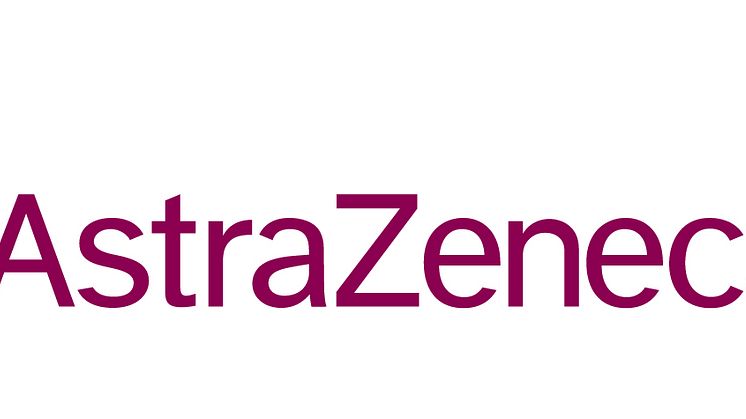
Pressmeddelande -
Lynparza receives positive EU CHMP opinion for use in germline BRCA-mutated HER2-negative advanced breast cancer
AstraZeneca and MSD, Inc., Kenilworth, NJ, US (MSD: known as Merck & Co., Inc. inside the US and Canada) today announced that the Committee for Medicinal Products for Human Use (CHMP) of the European Medicines Agency has adopted a positive opinion, recommending the use of Lynparza (olaparib) tablets as monotherapy for the treatment of adult patients with germline BRCA1/2-mutations, who have human epidermal growth factor receptor 2 (HER2)-negative locally advanced or metastatic breast cancer.
Patients should have previously been treated with an anthracycline and a taxane in the (neo)adjuvant or metastatic setting unless patients were not suitable for these treatments. Patients with hormone receptor (HR)-positive breast cancer should also have progressed on or after prior endocrine therapy, or be considered unsuitable for endocrine therapy.
Dave Fredrickson, Executive Vice President, Oncology, said: “Despite progress in treating patients with advanced breast cancer, there remains a significant unmet need for new treatment options. If approved, Lynparza will provide these patients with both a targeted and oral chemotherapy-free option. We now have evidence supporting the potential use of Lynparza in patients with BRCA-mutated breast, ovarian and pancreatic cancers, which demonstrates our ongoing commitment to improving patient outcomes in difficult-to-treat cancers.”
Roy Baynes, Senior Vice President and Head of Global Clinical Development, Chief Medical Officer, Merck Research Laboratories, said: “The positive opinion from CHMP for Lynparza in this patient population is an important milestone. This decision brings us one step closer to offering a new treatment option to patients with advanced breast cancer and further underscores the critical need to identify patients’ BRCA status, in addition to hormone receptor and HER2 expression status, as part of the management of this disease.”
The positive opinion is based on data from the randomised, open-label, Phase III OlympiAD trial, which tested Lynparza against the physician’s choice of chemotherapy.
Lynparza is currently approved in over 60 countries including those in the EU for the maintenance treatment of platinum-sensitive relapsed ovarian cancer regardless of BRCA status. It is approved in the US for 1st-line maintenance therapy in BRCAm advanced ovarian cancer following response to platinum-based chemotherapy. It is also approved in several countries, including the US and Japan, for germline BRCAm HER2-negative metastatic breast cancer previously treated with chemotherapy; regulatory reviews are underway in other jurisdictions.
About OlympiAD
OlympiAD was a global, randomised, open-label, multi-centre Phase III trial of 302 patients, assessing the efficacy and safety of Lynparza tablets (300mg twice daily) compared to the physician’s choice of chemotherapy (capecitabine, eribulin or vinorelbine); 205 patients were randomised to receive Lynparza and97 patients were randomised to receive chemotherapy.
Patients in the OlympiAD trial had germline BRCA1 and/or BRCA2-mutated, HER2-negative (HR-positive or triple negative) breast cancer and received Lynparza for treatment in the metastatic setting. Prior to enrolment, all patients were treated with an anthracycline (unless it was contraindicated) and a taxane chemotherapy in the neoadjuvant, adjuvant or metastatic setting. Patients with metastatic breast cancer (71% of patients) had received no more than two previous chemotherapy treatments for metastatic disease. Patients with HR-positive breast cancer had received at least one endocrine (hormonal) therapy (in the adjuvant or metastatic setting) and had disease progression during therapy, unless they had disease for which endocrine therapy was considered inappropriate. Previous treatment with platinum chemotherapy in the neoadjuvant, adjuvant or metastatic setting was allowed (28% of patients).
In the trial, Lynparza provided patients with a significant median progression-free survival improvement of 2.8 months (7.0 months for Lynparza vs. 4.2 months for chemotherapy). Patients taking Lynparza experienced an objective response rate (ORR) of 59.9%, which was double the response rate for those in the chemotherapy arm (ORR 29%). Data from the OlympiAD trial can be found in the 10 August 2017 issue of the New England Journal of Medicine.
The most common adverse reactions (≥20%) in the OlympiAD trial of patients who received Lynparza were nausea (58%), anaemia (40%), fatigue (including asthenia) (37%), vomiting (30%), neutropenia (27%), respiratory tract infection (27%), leukopenia (25%), diarrhoea (21%), and headache(20%).The percentage of patients who discontinued treatment in the Lynparza arm was 5% vs. 8% in the chemotherapy arm.
About advanced breast cancer
Advanced/metastatic breast cancer refers to Stage III and IV breast cancer. Stage III disease may also be referred to as locally-advanced breast cancer, while metastatic disease is the most-advanced stage of breast cancer (Stage IV) and occurs when cancer cells have spread beyond the initial tumour site to other organs of the body outside the breast. Since there is no cure for the disease, the goal of current treatment is to delay disease worsening or death.
In 2018, there were an estimated 2.1 million new cases of breast cancer worldwide – one in four cancer cases among women (24.2%). In Europe the estimated 5-year prevalence of breast cancer in 2018 was 2,054,887 cases.1Approximately 30% of women who are diagnosed with early breast cancer will go on to develop advanced disease.
About BRCA mutations
Breast cancer susceptibility gene 1/2 (BRCA1 and BRCA2) are human genes that produce proteins responsible for repairing damaged DNA and play an important role maintaining the genetic stability of cells. When either of these genes is mutated, or altered, such that its protein product either is not made or does not function correctly, DNA damage may not be repaired properly, and cells become unstable. As a result, cells are more likely to develop additional genetic alterations that can lead to cancer.
About Lynparza
Lynparza (olaparib) is a first-in-class PARP inhibitor and the first targeted treatment to block DNA damage response in cells/tumours harbouring a deficiency in homologous recombination repair (HRR), such as mutations in BRCA1 and/or BRCA2. Inhibition of PARP with Lynparza leads to the trapping of PARP bound to DNA single-strand breaks, stalling of replication forks, their collapse and the generation of DNA double-strand breaks and cancer cell death. Lynparza is being tested in a range of tumour types with defects and dependencies in the DDR.
Lynparza, which is being jointly developed and commercialised by AstraZeneca and MSD, is approved for multiple indications in advanced ovarian cancer and metastatic breast cancer and has been used in over 20,000 patients worldwide. On 26 February 2019, AstraZeneca and MSD announced that Lynparza became the first PARP inhibitor to demonstrate benefit in germline BRCAm metastatic pancreatic cancer in the Phase III POLO trial.
Lynparza has the broadest and most advanced clinical trial development programme of any PARP inhibitor, and AstraZeneca and MSD are working together to understand how it may affect multiple PARP-dependent tumours as a monotherapy and in combination across multiple cancer types. Lynparza is the foundation of AstraZeneca’s industry-leading portfolio of potential new medicines targeting DDR mechanisms in cancer cells.
About the AstraZeneca and MSD strategic oncology collaboration
In July 2017, AstraZeneca and Merck & Co., Inc., Kenilworth, NJ, US, known as MSD outside the United States and Canada, announced a global strategic oncology collaboration to co-develop and co-commercialise Lynparza, the world’s first PARP inhibitor and potential new medicine selumetinib, a MEK inhibitor, for multiple cancer types. Working together, the companies will develop Lynparza and selumetinib in combination with other potential new medicines and as a monotherapy. Independently, the companies will develop Lynparza and selumetinib in combination with their respective PD-L1 and PD-1 medicines.
About AstraZeneca in Oncology
AstraZeneca has a deep-rooted heritage in Oncology and offers a quickly-growing portfolio of new medicines that has the potential to transform patients’ lives and the Company’s future. With at least six new medicines to be launched between 2014 and 2020 and a broad pipeline of small molecules and biologics in development, we are committed to advance Oncology as one of AstraZeneca’s four Growth Platforms focused on lung, ovarian, breast and blood cancers. In addition to our core capabilities, we actively pursue innovative partnerships and investments that accelerate the delivery of our strategy as illustrated by our investment in Acerta Pharma in haematology.
By harnessing the power of four scientific platforms – Immuno-Oncology, Tumour Drivers and Resistance, DNA Damage Response and Antibody Drug Conjugates – and by championing the development of personalised combinations, AstraZeneca has the vision to redefine cancer treatment and one day eliminate cancer as a cause of death.
About AstraZeneca
AstraZeneca is a global, science-led biopharmaceutical company that focuses on the discovery, development and commercialisation of prescription medicines, primarily for the treatment of diseases in three therapy areas - Oncology, Cardiovascular, Renal & Metabolism and Respiratory. AstraZeneca operates in over 100 countries and its innovative medicines are used by millions of patients worldwide.For more information, please visit astrazeneca.comand follow us on Twitter @AstraZeneca.
| Media Relations | ||
| Gonzalo Viña | UK/Global | +44 203 749 5916 |
| Rob Skelding | UK/Global | +44 203 749 5821 |
| Matt Kent | UK/Global | +44 203 749 5906 |
| Jennifer Hursit | UK/Global | +44 203 749 5762 |
| Christina Malmberg Hägerstrand | Sweden | +46 8 552 53 106 |
| Michele Meixell | US | +1 302 885 2677 |
| Investor Relations | ||
| Thomas Kudsk Larsen | +44 203 749 5712 | |
| Henry Wheeler | Oncology | +44 203 749 5797 |
| Christer Gruvris | BioPharma - Cardiovascular; Metabolism | +44 203 749 5711 |
| Nick Stone | BioPharma - Respiratory; Renal | +44 203 749 5716 |
| Josie Afolabi | Other | +44 203 749 5631 |
| Craig Marks | Finance; Fixed Income | +44 7881 615 764 |
| Jennifer Kretzmann | Retail Investors; Corporate Access | +44 203 749 5824 |
| US toll-free | +1 866 381 72 77 | |
References
1 InternationalAgency for Research on Cancer.Breast-fact-sheet. Available at http://gco.iarc.fr/today/data/factsheets/cancers/20-Breast-fact-sheet.pdfLast accessed February 2019
Ämnen
Om AstraZeneca
AstraZeneca är ett globalt, innovationsdrivet bioläkemedelsföretag med fokus på forskning, utveckling och marknadsföring av receptbelagda läkemedel, primärt för behandling av sjukdomar inom tre huvudsakliga terapiområden: cancer, kardiovaskulära sjukdomar, njursjukdomar och metabola sjukdomar och sjukdomar i andningsvägarna. Bolaget är också selektivt aktivt inom autoimmunitet, neurovetenskap och infektion. AstraZeneca bedriver verksamhet i över 100 länder och dess innovativa läkemedel används av miljontals patienter över hela världen.
Mer information finns på: www.astrazeneca.com och www.astrazeneca.se. Du kan även följa oss på twitter https://twitter.com/AstraZenecaSE


